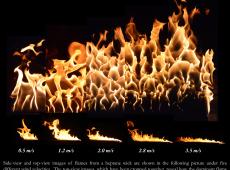Large wildfires of increasing frequency and severity threaten local populations and natural resources while contributing carbon emissions into the earth-climate system. Although wildfires have been researched and modeled for decades, no verifiable physical theory of spread is available to form the basis for the precise predictions needed to manage fires more effectively and reduce their environmental, economic, ecological, and climate impacts. This presentation will begin by summarizing recent research conducted at the Fire Lab aimed at unraveling how buoyant flame dynamics seen in wildfires contribute to their spread. Scale modeling experiments conducted at the University of Maryland and UC Berkeley further exploring this behavior will be detailed, including new flow measurement techniques. In the most extreme urban and wildland fires, fire whirls can form, presenting significant hazards. After a brief review of our state of knowledge concerning fire whirls, two new approaches using the intensification of combustion seen in fire whirls to reduce their emissions will be covered. First, exciting recent studies on the blue whirl will be presented, describing how this small, completely blue, soot-free flame that evolves from traditional fire whirls forms. Finally, new results on the use of fire whirls to clean up oil spills over water will be presented.
The Dynamic Behavior of Fires: from Wildfires to Fire Whirls
Presenter Biographies
Dr. Michael Gollner is an Associate Professor and Deb Faculty Fellow in the Department of Mechanical Engineering at the University of California, Berkeley. He was previously an Associate Professor of Fire Protection Engineering at the University of Maryland, College Park, MD from 2012-2019. He is broadly interested in fire science problems, utilizing experiments and combustion and fluid dynamics theory to solve problems. Much of his work is focused on applications to wildfires, including their spread through vegetation, ignition of structures in the wildland-urban interface (WUI), transport of embers, fire whirls, and emissions from wildfire smoke. Dr. Gollner is active in professional society leadership serving on boards for the IAFSS, WSSCI, IAWF and NFPA FPRF. He has been awarded the NSF CAREER award, Tsuji Early Career Award by the Combustion Institute, Proulx Early Career Award in Fire Safety Science, and the Fire Protection Research Foundation Medal. He received his B.S. (2008), M.S. (2010) and Ph.D. (2012) in Mechanical Engineering from the University of California, San Diego.
